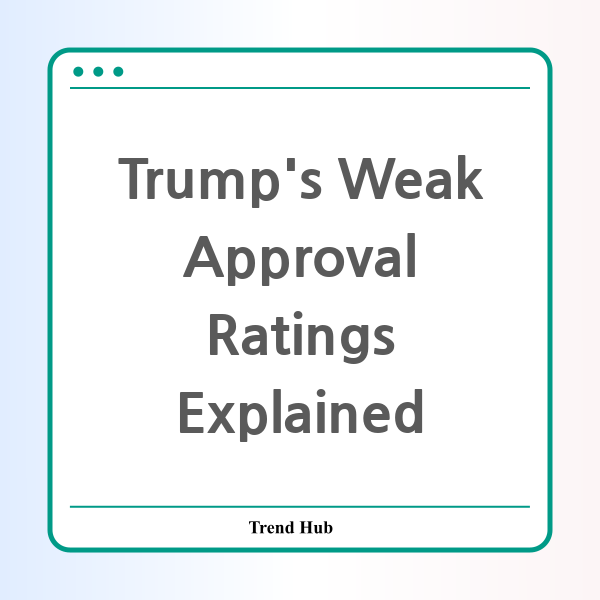* This website participates in the Amazon Affiliate Program and earns from qualifying purchases.

As Trump begins another term in office, questions abound regarding his initial approval ratings. How will these ratings shape his presidency, and what does history tell us about presidential popularity at the start of a term?
Donald Trump's current approval rating stands at a modest 50%, according to the latest polls. Surprisingly, this figure is lower than many of his predecessors, making it a topic of significant interest among political analysts and the public alike. In fact, since World War II, Trump's initial net approval rating is one of the weakest, trailing only his own ratings from 2017.
The significance of starting with a weak approval rating cannot be overstated. Traditionally, newly elected presidents enjoy a honeymoon phase, gaining public support as they take office. This initial goodwill often provides a crucial opportunity to advance their policies and set the legislative agenda. However, Trump's first ratings present considerable challenges ahead, suggesting potential headwinds for his administration.
Trump's average approval rating of 50% reflects a divided public perception of his leadership thus far. Despite some thematic support—such as backing for his executive order targeting illegal immigrants accused of crimes—he faces considerable backlash on other issues. His decisions to pardon individuals involved in the January 6 Capitol breach and withdraw from international climate agreements are notably unpopular, underscoring the contentious atmosphere surrounding his presidency.
The 11 polls reviewed indicate that 43% of Americans disapprove of Trump's handling of his duties. Comparatively, other recent presidents like Joe Biden and George W. Bush enjoyed higher net approval ratings when they started their terms, such as +22 for Biden and +28 for Bush. This historical context highlights just how much ground Trump has to cover to gain widespread acceptance among the electorate.
Examining Trump's initial standing, we find that he is pulling in a net approval rating of +7 percentage points. This is a stark contrast to the +28 points George W. Bush had upon taking office and the +22 points for Joe Biden. Such figures suggest a significant shift in public sentiment that Trump must navigate during his current term.
Looking deeper into the poll data, several issues emerge that could affect Trump's approval ratings as his presidency unfolds:
- Immigration Policies: The public displays overwhelming support for deporting immigrants involved in violent crimes, which could bolster Trump's standing if he communicates his stance effectively.
- Economic Challenges: With rising inflation and increasing costs of living, people's confidence in Trump’s ability to manage the economy is waning. Many Americans doubt his capability to decrease the price of essential goods and services.
- Public Sentiment on Tariffs: The polarized views on Trump’s tariff proposals could also play a role in influencing his approval ratings. Currently, support for broad import tariffs stands at around 29%, highlighting doubts about their effectiveness.
- Political Dynamics: Trump's approval may also be influenced by historical trends, where presidents typically see a decline in popularity following an initial surge, often due to policy decisions that alienate certain voter bases.
In summary, as Trump embarks on this term, he finds himself in a precarious position, grappling with public discontent stemming from both his policies and the general economic environment. While there is potential for his approval ratings to improve over time, historical trends coupled with current circumstances suggest a challenging road ahead.
This starting point for Trump's presidency raises critical questions about his future strategies and how he will choose to engage with both supporters and detractors in the months to come. Will he adapt successfully to the shifting political landscape, or will he struggle against the gravitational pull of declining approval ratings?
* This website participates in the Amazon Affiliate Program and earns from qualifying purchases.